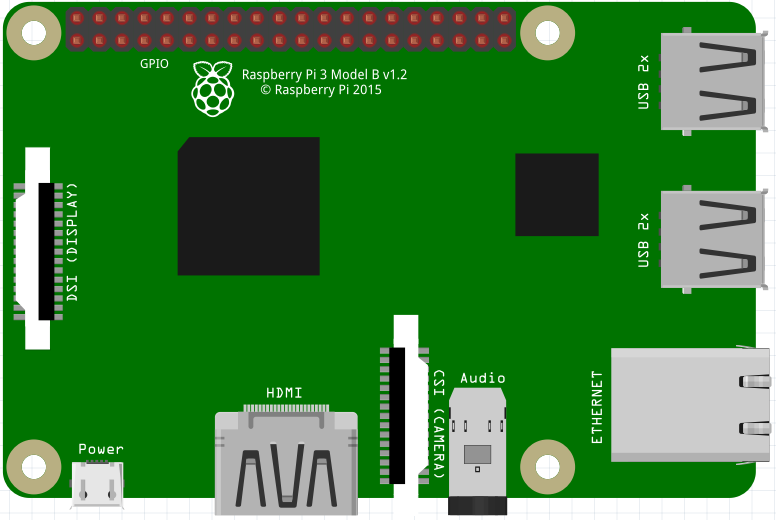This is the base Nerves System configuration for the Raspberry Pi 3 Model B.
| Feature | Description |
|---|---|
| CPU | 1.2 GHz quad-core ARMv8 |
| Memory | 1 GB DRAM |
| Storage | MicroSD |
| Linux kernel | 4.9 w/ Raspberry Pi patches |
| IEx terminal | HDMI and USB keyboard (can be changed to UART) |
| GPIO, I2C, SPI | Yes - Elixir ALE |
| ADC | No |
| PWM | Yes, but no Elixir support |
| UART | 1 available - ttyAMA0 |
| Camera | Yes - via rpi-userland |
| Ethernet | Yes |
| WiFi | Yes - Nerves.Network |
| Bluetooth | Not supported yet |
The base image includes drivers for the onboard Raspberry Pi 3 wifi module
(brcmfmac driver).
There's a subtle coupling between the nerves_system_br version and the Linux
kernel version used here. nerves_system_br provides the versions of
rpi-userland and rpi-firmware that get installed. I prefer to match them to
the Linux kernel to avoid any issues. Unfortunately, none of these are tagged by
the Raspberry Pi Foundation so I either attempt to match what's in Raspbian or
take versions of the repositories that have similar commit times.
The Linux kernel compiled for Nerves is a stripped down version of the default Raspberry Pi Linux kernel. This is done to remove unnecessary features, select some Nerves-specific features, and to save space. To reproduce the kernel configuration found here, do the following (this is somewhat tedious):
- Start with
arch/arm/configs/bcmrpi_defconfig. This is the kernel configuration used in the official Raspberry Pi images. - Turn off all filesystems except for
ext4,squashfs,tmpfs,proc,sysfs, andvfat. Squashfs only needs ZLIB support. vfatneeds to default toutf8. Enable native language support forascii,utf-8,ISO 8859-1, codepage 437, and codepage 850.- Disable all network drivers and wireless LAN drivers except for Broadcom FullMAC WLAN.
- Disable PPP and SLIP
- Disable the WiFi drivers in the Staging drivers menus
- Disable TV, AM/FM, Media USB adapters, DVB Frontends and Remote controller support in the Multimedia support menus.
- Go to
Device Drivers->Sound card support. DisableUSB sound devicesin ALSA. DisableOpen Sound System. - Go to
Device Drivers->Graphics support. DisableDisplayLink - In
Kernel Features, selectPreemptible Kernel (Low-Latency Desktop), disable the memory allocator for compressed pages. - In
Userspace binary formats, disable support for MISC binaries. - In
Networking support, disable Amateur Radio support, CAN bus subsystem, IrDA subsystem, Bluetooth, WiMAX, Plan 9, and NFC. (TBD - this may be too harsh, please open issues if you're using any of these and it's the only reason for you to create a custom system.) - In
Networking options, disable IPsec, SCTP, Asynchronous Transfer Mode, 802.1d Ethernet Bridging, L2TP, VLAN, Appletalk, 6LoWPAN, 802.15.4, DNS Resolver, B.A.T.M.A.N, Open vSwitch, MPLS, and the Packet Generator in Network testing. - In
Networking support->Wireless, enable "use statically compiled regulatory rules database". Build incfg80211andmac80211. Turn offmac80211mesh networking and LED triggers. Turn offcfg80211wireless extensions compatibility. - In
Kernel hacking, disable KGDB, and Magic SysRq key. - In Device Drivers, disable MTD support. In Block devices, disable everything but Loopback and RAM block device. Disable RAID and LVM.
- In
Enable the block layer, deselect everything but the PC BIOS partition type (i.e., no Mac partition support, etc.). - In
Enable loadable module support, select "Trim unused exported kernel symbols". NOTE: If you're having trouble with an out-of-tree kernel module build, try deslecting this!! - In
General Setup, turn offinitramfs/initfdsupport, Kernel .config support, OProfile. - In
Device Drivers -> I2C -> Hardware Bus Supportcompile the module into the kernel and disable everything butBCM2708 BSCsupport. - In
Device Drivers -> SPIcompile in the BCM2835 SPI controller and User mode SPI device driver support. - In
Device Drivers -> StagingdisableSupport for small TFT LCD modules - In
Device Drivers -> Dallas's 1-wire support, disable everything but the GPIO 1-Wire master and the thermometer slave. (NOTE: Why is the thermometer compiled in? This seems historical.) - Disable
Hardware Monitoring support,Sonics Silicon Backplane support - In
Device Drivers -> Character devices -> Serial drivers, disable 8250 and SC16IS7xx support. Disable the RAW driver. - In
Networking support->Network options, disableIP: kernel level autoconfiguration - In
Networking support->Network options->TCP: advanced congestion controldisable everything except forCUBIC TCP. - Disable
Real Time Clock. - Disable everything in
Cryptographic APIandLibrary routinesthat can be disabled. Sometimes you need to make multiple passes. - Disable EEPROM 93CX6 support, PPS support, all GPIO expanders, Speakup core, Media staging drivers, STMicroelectronics STMPE, anything "Wolfson".
- Disable most ALSA for SoC audio support and codecs. NOTE: We probably should support a few, but I have no clue which ones are most relevant and there are tons of device drivers in the list.
- Disable IIO and UIO.
- Disable NXP PCA9685 PWM driver
Image credit: This image is from the Fritzing parts library.

